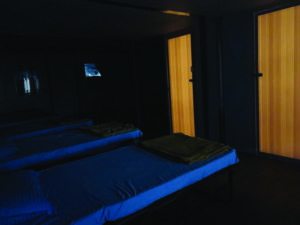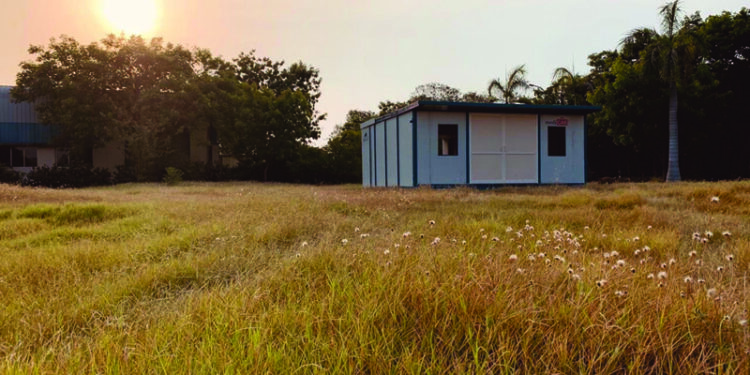NE SCIENCE & TECHNOLOGY BUREAU
CHENNAI, JULY 16
Indian Institute of Technology Madras-incubated Start-up, Modulus Housing has developed a portable hospital unit that can be installed anywhere within two hours by four people.

Called ‘MediCAB,’ it is a decentralized approach to detect, screen, identify, isolate and treat COVID-19 patients in their local communities through these portable microstructures. A demonstration video of the ‘MediCAB’ can be obtained by clicking HERE.
‘MediCAB’ has been launched recently in Wayanad District of Kerala where the units are being deployed to treat COVID-19 Patients. The startup is developing micro hospitals that can be deployed rapidly across the nation. The Medicab is foldable and is composed of four zones – a doctor’s room, an isolation room, a medical room/ward and a twin-bed ICU, maintained at negative pressure.

This deployment in Kerala has been undertaken with grant funds from Habitat for Humanity’s Terwilliger Center for Innovation in Shelter. The startup collaborated with Sree Chitra Tirunal Institute for Medical Sciences and Technology (SCTIMST) who provided inputs on the certifications and customizations necessary for the project.
Founded by two IIT alumni in 2018, Modulus Housing was supported by IIT Madras Incubation Cell and has a vision to revolutionise housing through modular prefab structures. They have re-purposed their designs to support the fight against COVID-19.
Emphasising the need for such innovations in COVID-19 times, Shreeram Ravichandran, Chief Executive Officer, Modulus Housing, said, “The outcome of this pilot project in Kerala will help in proving the applicability of the technology and advantages of micro hospitals, with MediCAB as an instant infrastructure solution. It can be easily assembled in eight hours by four people. When folded, our collapsible cabins are reduced five-fold, making it very cost-effective for transportation.”
Further, Shreeram Ravichandran said, “Health infrastructure is crucial in fighting any pandemic. With a contagious disease such as COVID-19, it is essential to have smart health infrastructure to screen, contain and treat people. Unlike urban areas where there is plenty of existing infrastructures that can be converted to hospitals, rural areas do not have a lot of infrastructure. It is difficult to construct buildings from scratch as the requirement is immediate. As the rural population density is relatively low, more micro hospitals help greatly in tackling COVID-19 cases.”
Modulus is working on a Dual design where these can be rapidly launched as COVID-19 isolation wards. Post-COVID-19, these can be transformed into micro-hospitals/clinics in Rural India where the medical infrastructure needs to be augmented. Modulus Housing has set up its manufacturing unit at Chengalpet (located about 35 kms from Chennai).
India has 0.7 beds per 1,000 persons. Innovations such as the MediCAB will help boost the healthcare infrastructural in India as it can be rapidly transported (Six units can fit in a truck). It can be deployed at any time and to any place.
Highlighting the innovations from startups supported by IIT Madras Incubation Cell, its Chief Executive Officer Tamaswati Ghosh, said, “We are very proud of our startups who are working on a range of products that are vital to India’s fight against COVID-19, from N95 masks, ventilators, affordable testing kits to portable hospital infra. They have quickly mobilized and repurposed their offerings in response to the situation and are striving to make a positive contribution to the nation’s anti-virus efforts. IITM Incubation Cell continues to assist its startups through these challenging times and hopes that industry support will help them ramp up their efforts in a more meaningful way.”
Their flagship project, foldable cabins are modular, portable, durable, easy to set up and can be customised as per the requirements of the customer. Such units have already been delivered to prestigious clients across sectors such as L&T, Tata Group, and Shapoorji, Selco, among others.
The USP of the MediCABS is that Modulus makes use of a novel technology of collapsible structures. It comes equipped with a prefabrication modular technology and a telescopic frame that allows the model to be shrunk to 1/5th of its original size, which makes it convenient for storage and transportation.
Post-Pandemic, these cabins can be remodelled into micro-hospitals/clinics for rural places. They can be easily shifted and placed there. Modulus has already been operating in three sectors like construction and infrastructure, oil and gas and healthcare. Modulus is also looking at expanding to sectors such as event management, tourism and the defence forces.










